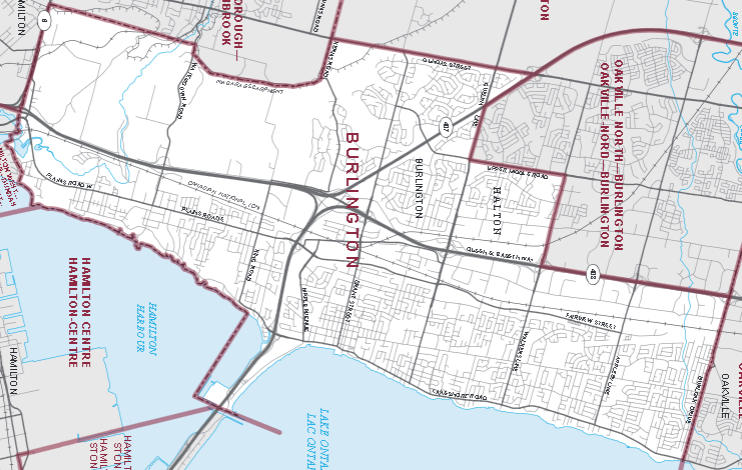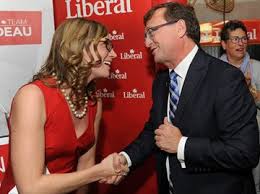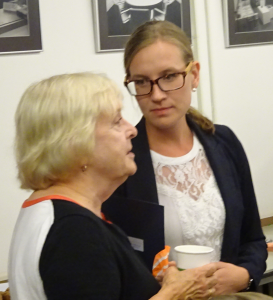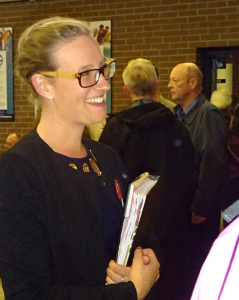 By Staff
By Staff
June 3, 2016
BURLINGTON, ON
The Member of Parliament for Burlington rose to speak on the House of Commons about the matter of electoral reform – changes to be made in the way Canadians elect their Members of Parliament.
Mr. Speaker, I am pleased to rise today to participate in this important and historic debate on the establishment of a special all-party committee on electoral reform. This is an issue that affects all Canadians, and I am glad to see such strong principles proposed in the amended motion to guide this committee’s study.
I wish to spend my time today discussing some of the changes to our electoral system that have been introduced over the past century; changes that at the time were seen as rather dramatic alterations to our system.
Many of these reforms, however, are now looked back upon by Canadians as moments of true progress in the history of our great democracy.

Boundary for the constituency of Burlington
The electoral system we have today is the product of almost 150 years of evolution. The election we saw in October was quite different from elections upon Confederation, when only a fraction of Canadians, namely land-owning men, had a say in our democratic institution.
Our government’s pledge to replace the first past the post system is just another step in this historical evolution to a more inclusive, efficient, and stronger electoral system for all Canadians.
Allow me to begin in 1920, over a half century after Confederation.
After 50 years of elections in this country, Parliament established the Office of the Chief Electoral Officer. It was not until 1927 that the Chief Electoral Officer was appointed by the House and not the government. These were seen as quite major changes at the time, but they are ones we can all look back on, knowing they have helped lead to nearly a century of trusted and independent electoral administration in this country.
It was not until 1964, nearly a full century after Confederation, that Parliament introduced independent electoral district boundary commissions to draw riding boundaries, bringing an end to gerrymandering. Prior to this, the government could simply decide who got to vote where, with little recourse for individuals, communities, or opposition parties. This is another instance of what was once proclaimed to be a fundamental change to our electoral system. In hindsight, we see that this reform has helped build trust among Canadians that our electoral system has integrity, that it is fair, and that all communities have a voice.

Karina Gould accepting congratulations from former MP Mike Wallace the night of the last federal election.
In our ever-evolving system, parties only began registering with Elections Canada in 1970, and they only became subject to election spending limits in 1974. After a century of elections, Parliament significantly altered our politics by removing the role of big money in our elections. I truly believe our democracy is stronger because of that, but once again, it was an area of contentious debate at the time. Today, the idea of unlimited spending in an election would be quickly dismissed by Canadians as a barrier to the level playing field we hold dear for free and fair elections. We are proud that our elections are based on ideas and debate, and not simply dollars.
I have spoken briefly of some reforms to the electoral system itself, but I would like to turn now to the increasing franchise over the years; a clear example of how far our electoral system has progressed since Confederation.
Allow me to return back to the 1920s, when elections in this country were decentralized and run under a hodgepodge of provincial statues.
In the 1920s, the federal legislation deferred to the provinces in allowing disqualifications on the right to vote for “reasons of race”. This provision worked to disqualify many Canadians, including those of Chinese, Japanese, and Ukrainian descent, among others. However, it was not until 1948 that Parliament deleted references to disqualification on the basis of race. It was not until 1950 that Parliament allowed the Inuit the right to vote, and it was not until 1960 that Parliament allowed first nation people the right to vote without forcing them to give up their status or home on a reserve.
Expanding the franchise was divisive at the time. Today, however, we look back and simply wonder what took Parliament so long to recognize the rights of all Canadians in exercising their vote.

Karina Gould listening to a constituent.
Women were not able to vote until legislative changes were enacted in 1918.
Those individuals living in poor houses or the homeless were not able to vote until 1929. War objectors were not able to vote between 1938 and 1955.
It was only in 1970 that the voting age was lowered to 18 from 21.
What I am trying to get at is that, when we reflect on these developments without the partisan frames in which they were originally debated, we see reforms that uphold and correspond to our values as Canadians; we see reforms that uphold the rights of all Canadians; and we see reforms that strengthen the bond between the people and the government and that instill trust that the government is formed by the true democratic will of all Canadians.
It is almost incomprehensible that we could ever exclude a full 50% of society from the franchise, that we could exclude indigenous peoples, ethnocultural minority groups, and those who dared to express different beliefs from those of the government of the day. While I am certainly not proud of the history of disenfranchisement in Canada’s electoral history, I am truly proud of how far our democracy has evolved into a more inclusive system for all Canadians.
Electoral reform is the next step in this evolution toward a more inclusive system. We can build a better system that provides a stronger link between the democratic will of Canadians and the election results, one that motivates Canadians to take part, one that reflects our collective values of fairness, inclusiveness, gender equity, openness, and mutual respect. To get there, the process leading to reform must also embody these values.
Parliamentarians will need to set aside partisan interests and engage in a thoughtful and substantive dialogue with each other and with citizens.

Karina Gould during the federal election debates in Burlington.
I strongly believe that stepping away from the first past the post system and embracing a new system that can reflect these values and the values articulated in this amended motion would be another milestone in the history of Canada’s elections. I suspect future generations will look back at the reforms proposed in this motion and reflect on them, as I have done today with past reforms. I suspect they will note this is yet another example of how our electoral system has evolved to further increase the inclusion of all peoples, to better reflect the will of voters and the representation of the House, and to work toward a system that produces a House that looks more and more like the faces of Canadians.
I hope all members will join me and support the creation of this committee.


















I support this committee “only” if it leads to a referendum on the matter.Readers if you feel the same see :https://www.surveygizmo.com/s3/2770726/Electoral-Reform-Voter-Sentiment-Survey-2016